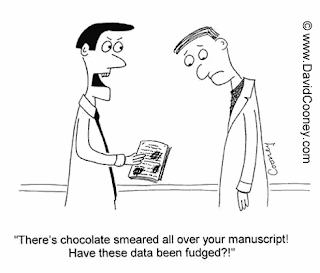GenomeWeb posted a pretty cool article this month about the dilemma of whether or not to publish in Science. I think it's pretty well written and makes very valid points, so instead of reiterating it, here's the link.
When I read articles assigned in class, or journals on my own, I always tend to be drawn to finding out how the researchers could potentially be displaying their conclusions to appear that there is actually more of an effect than there really is. This article adequately brings up that same question, and alludes to Daniele Fanelli, who's research supposedly determined that this 'positive bias' tends to get larger as you move away from the physical/chemical sciences and closer to the behavioral sciences along the "spectrum of science". I would just expect that to be the case though, being as chemical science is largely based on strict numbers and calculations where behavioral studies are largely based on observations and drawing (often subjective) conclusions.
They talk about "changing the system". Having journals specifically for negative results!? That just seems kind of unnecessary and weird to me. I essentially don't think this positive bias can ever be removed, but I think it's necessary to make the scientific community aware of this bias when they read newly published literature.
My own proposal? More websites like the Faculty of 1000 Biology website. Here, established professionals can read new literature and mark specific ones that they think are especially cutting edge or valuable for future research. They also take validity into consideration, and most of the people rating these articles have a pretty good eye for true results when they see 'em. It's a great help for gathering sources for a paper, or just for pointing you in the right direction for leisurely reading about new things in the field.

Important topic. Why not just have a rating system where anyone, not just the top 1000 faculty members, can rate an article after they read it, and then filter it to the top? Then eliminate affiliated journals entirely and have every article published onto pub med central once it gets passed peer review. Negative results are especially important in drug trials, which is why every new drug test has to register with the fda: http://clinicaltrials.gov/ct2/invest. Expanding this would be another way of curbing publication bias.
ReplyDeleteI agree, and I tend to think that often negative results are equally, or more vital than positive ones. But I think having journals dedicated to studies with negative results would be frustrating, and most likely unorganized. I think studies with negative results, like you said, should be published publicly online alongside positive results within the same topic.
ReplyDeleteIt's also interesting that F1000 biology makes you pay to use their service after a 2-week trial..